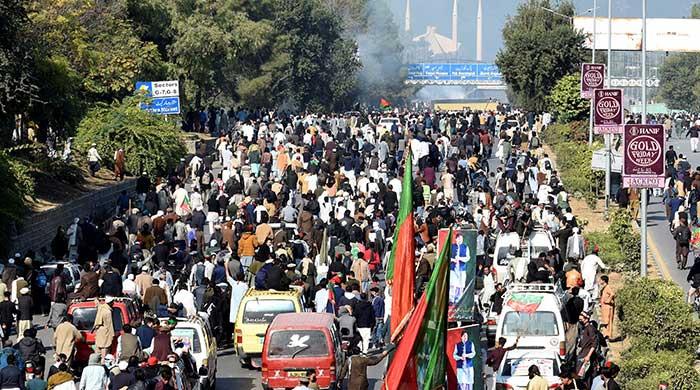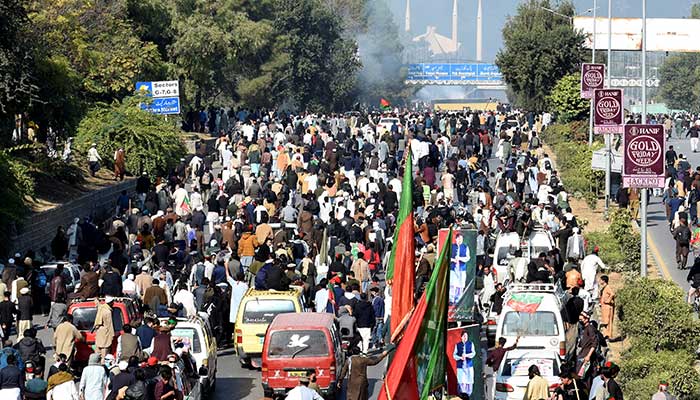Experts weigh in on economic repercussions of another PTI anti-govt movement


- Expert warns of drop in remittances due to use of informal channels.
- Points out towards prospective difficulties in tax collection for govt.
- Need to observe how Pakistani expats respond to Khan’s call: banker.
KARACHI: The Pakistan Tehreek-e-Insaf (PTI) has marched onto Islamabad on multiple occasions in recent months with the latest protest occurring in November last month which saw the government launching a midnight crackdown against party workers to disperse them.
However, in the days leading up to the protest, the government had adopted stringent measures in Punjab and even more so in the federal capital sealing off the routes to deter the protesters’ march.
The roadblocks, coupled with restricted internet and mobile services hampered the residents’ daily lives took an economic toll on the people.
Lamenting the economic aftermath, Finance Minister Muhammad Aurangzeb back then had said that the country suffered losses amounting to Rs190 billion on a daily basis due to the closure of roads and shutdowns triggered by the protest calls.
However, despite strong criticism from various segments of the society regarding the adverse effects of such protests, Khyber Pakhtunkhwa (KP) Chief Minister Ali Amin Gandapur on Saturday threatened to launch further “attacks” against the incumbent government.
“We will continue launching attacks like the battle of Panipat. We will conquer if demands are not met,” he said while talking to the media in Peshawar.
“We have launched [just] 5 attacks and will continue to launch the rest,” he added.
However, this is not the only action hinted at by the former ruling party as its founder Imran Khan, who has been behind bars for more than a year now, has announced to launch a nationwide civil disobedience campaign from December 14 if the party’s demands are not met.
As part of this movement, overseas Pakistanis will be encouraged to reduce their remittances and participate in a boycott campaign.
Deeper economic crisis
Weighing in on the PTI’s announcement, experts have raised concerns regarding the economic aftermath of such a campaign, The News reported on Sunday.
“If the PTI launches a civil disobedience movement, it could have serious consequences for Pakistan’s economy. Remittances, which bring in over $30 billion annually, might drop if people are encouraged to use informal channels like hawala instead of official banking systems,” said Saad Hanif, head of research at Ismail Iqbal Securities.
“Political instability might scare off investors, weaken the rupee further, and drive up inflation, making life harder for ordinary people. Overall, it could disrupt the government’s plans and push the economy deeper into crisis,” he added.
Hanif also expressed that “[civil disobedience] would reduce the country’s foreign exchange reserves. The government could also struggle to collect taxes and utility bills, worsening its financial problems and delaying important projects”.
Meanwhile, Director Research at AKD Securities Limited Awais Ashraf is of the view that potential civil disobedience will not significantly impact remittance flows, as people send this money to support their families and some flows are earnings of freelancers.
Remittances to Pakistan have increased to $11.8 billion in July-October FY25, up 34.7% from the same period last year, providing crucial support to the external account.
Both the government and the central bank anticipate that remittances will reach historic levels of $35 billion in FY25, averaging $2.9 billion per month so far. These significant inflows will strengthen the reserves, offering a much-needed boost to the economy.
A senior banker said that we need to observe how Pakistani expatriates respond to the planned call.
In reality, Pakistan regularly receives significant remittance inflows from its migrants working abroad, most of whom belong to the lower and middle classes and typically engage in blue-collar jobs in Gulf countries, particularly Saudi Arabia and the United Arab Emirates, he said.
However, the expatriates who may have acquired nationality in their host countries often send funds back home during occasions such as Eid festivals, for Hajj, for charity, and for making investments in the country.
Khan’s latest announcement comes at a time when the nation’s struggling economy is on the mend, largely thanks to a bailout from the International Monetary Fund (IMF). As a result, inflation has decreased, dropping to 4.9% in November — the weekly inflation has further shrank to 3.57%.
The current account balance shifted to a surplus of $218 million in the first four months of the fiscal year 2025, compared to a deficit of $1.528 billion in the same period last year.
As of November, the foreign exchange reserves held by the State Bank of Pakistan (SBP) amounted to $12 billion, which is sufficient to cover more than two months of imports.
Interest rates have also fallen, decreasing by 700 basis points to 15% since June. Moreover, Pakistan’s benchmark stock index has performed well, surpassing 100,000 points.
If the economy suffers as a result of the political unrest, the IT industry, which is already suffering from slow speed, is likely to experience more difficulties.
Additionally, consistent internet disruptions and its slow speed are detrimental to the national economy in general and the IT sector in particular, which will further affect adversely the economic activities and damage the reputation of the country if the situation persists, said Saad Shah, an IT exporter.
As far as the IT sector is concerned, various IT companies are facing challenges in completing their projects on time despite their multiple efforts of working extra hours due to the prevailing internet situation.
Large IT companies having annual contracts with local and foreign clients may survive through managing their work from offshore offices, but medium and small players including freelancers could not have options but to lose projects and clients, Shah further said.



